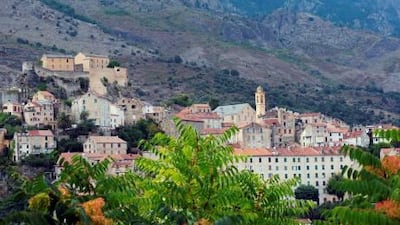AJACCIO, CORSICA // The sparkling Mediterranean waters and rugged mountain backdrop provide an idyllic setting for the Corsican capital, but stark nationalist graffiti daubed on walls in the town centre shows that tensions over the island's status as part of France continue.
Ruled from Italy for hundreds of years, the birthplace of French emperor Napoleon Bonaparte has long had an uneasy relationship with its rulers in Paris since it became part of France in 1769.
This friction manifests itself today in occasional bombings targeting French-owned holiday homes, banks or military barracks. Mostly, however, the push for autonomy or independence has been carried out by peaceful means.
According to Gerard Dykstra, a spokesman for Corsica Libera, a political party formed from a variety of pro-independence organisations early last year, separating from France is about giving Corsicans their "national rights".
"Our history, our language, our vision of the world - we are a nation," he said.
"We are the lonely people in Europe. We are a nation in Europe that does not have its rights.
"We have not got official autonomy,`' he said.
"Our parliament does not have power to make law. We want the same rights as Scotland, for example."
Results earlier this year for the Corsican assembly may have significance, despite the body's limited powers, with nationalists gaining their best-ever results, taking 15 of the 51 seats. The pro-autonomy Femu Corsica party, secured 11 and Corsica Libera four.
Even the separatist Corsica Libera does not call for an immediate breakaway from France, instead advocating "a road map" to independence.
"We want a process," Mr Dykstra said. "Not immediately, to have time to change our economy, to have a more strong economy."
Indeed, economic factors loom large in the views of the those Corsicans - and they make up the vast majority of residents - who are opposed to independence or any form of autonomy.
The island's residents rely heavily on the state for employment, and without ties to mainland France, many feel the island could struggle.
"Pure independence for an island - it's very difficult," said Jo Bocognano, an Ajaccio shopkeeper who relies on tourists for much of his business and estimates just one in 20 islanders want to go it alone.
The separtists fear that remaining part of France risks excessive development on the lightly industrialised island and could lead to much of the coast becoming, as they see it, spoiled in the way of parts of mainland France.
Attempts in the past decade towards extending autonomy have faltered. Key proposals of the Matignon Process championed by the former French prime minister Lionel Jospin to expand the legislative powers of the island's assembly were thrown out in 2002 as unconstitutional.
The following year, a referendum that would have given the island a single administrative body to replace its two regional departments was narrowly defeated amid concern among nationalists the proposals did not genuinely increase greater local powers.
Nationalists have nonetheless achieved increased status for the Corsican language, an Italian dialect spoken by about two-thirds of the island's population of 260,000. It is now more commonly taught in schools, although it has yet to become compulsory. The use of French remains contentious, with French place names often painted over on road signs.
Despite the island's status remaining a source of contention, violence will dwindle, as with Basque separatists in Spain and republicans in Northern Ireland, with the political "normalisation" of Corsica's nationalists, believes Helen Hintjens, a senior lecturer in development and social justice at the International Institute of Social Studies of Erasmus University, in Rotterdam.
The militant campaign for independence was most visible in the 1970s, partly because many French people from the country's former colonies in North Africa moved to Corsica.
Groups such as the National Liberation Front of Corsica remain active through occasional bombings, some on the French mainland.In 1998, France's chief representative on the island, Claude Erignac, was shot dead in the capital.
"Maybe there's always a faction that will continue with armed resistance, but they won't be as many and it won't be as easy for them be cause they're not representative of the dominant independence movement," she said.
The separatist movement will "retain a core of support and continue to attract the younger generation", believes Farimah Daftary, a researcher who has published extensively on Corsican constitutional issues.
"However, due to waves of arrests, internal infighting and assassinations and simple ageing, as well as corruption, the level of professionalism and commitment to ideals is at a much lower level than in the 1970s," she said.


